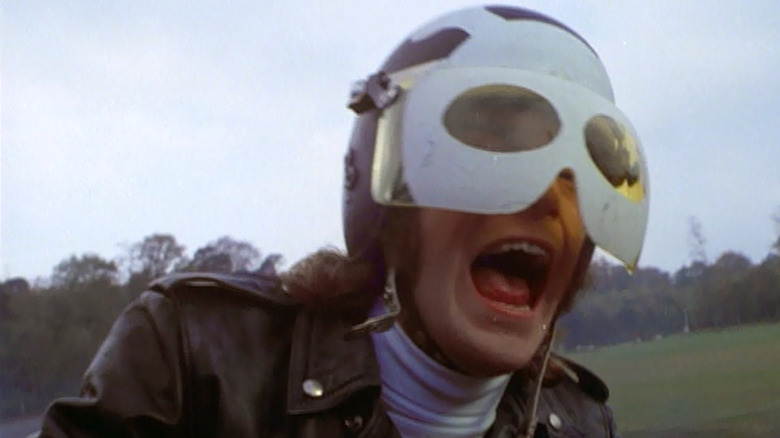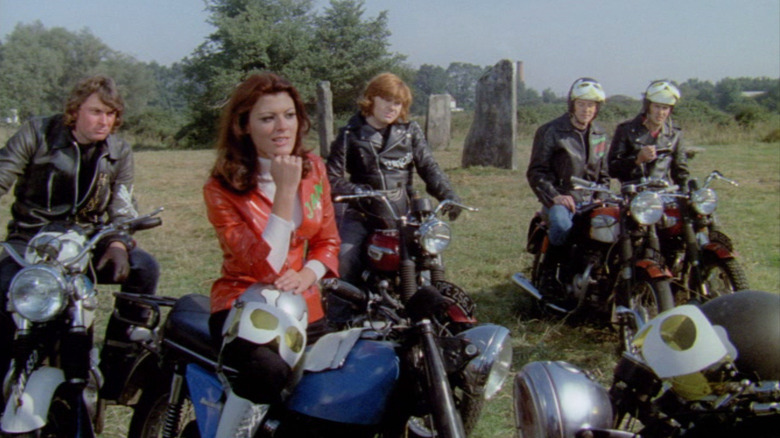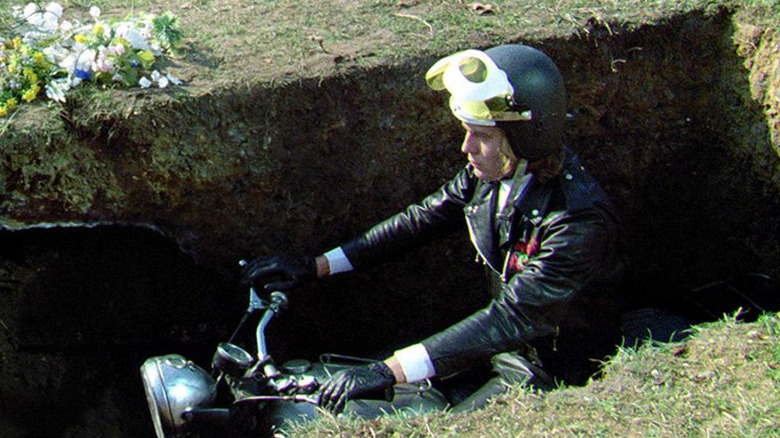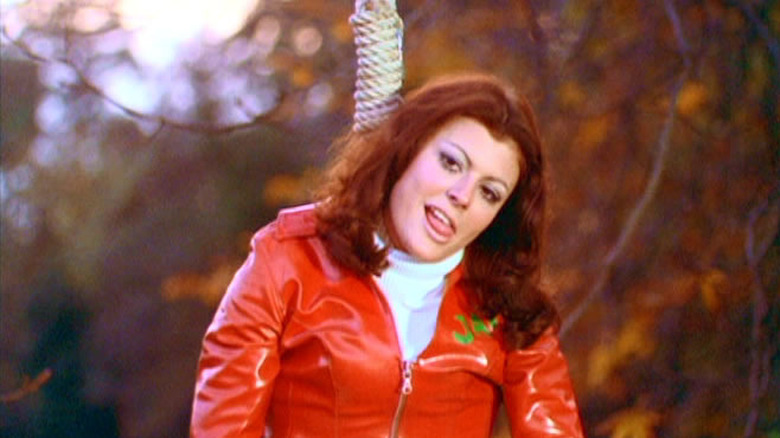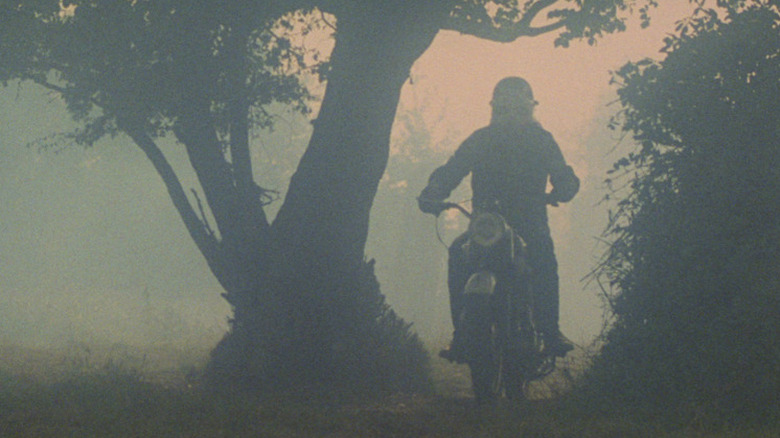The Wildest Horror Movie You've Never Seen Deserves A Remake
Out of the dewy curls of a mist stand some large stones. Among them, the Living Dead ride the earth, swirling their motorcycles in and out of the haze in slow-motion. The teenage dirtbags who ride them wear helmets jazzed up with a cartoonish skull and crossbones design, and personalized leather jackets. Though the script originally called for them to come creeping in Harley Davidsons, the final product shows its hoodlums silently rolling through on "clapped-out 350 AJS" that needed constant maintenance just to stay running for production. It was on these hoary road hogs that the gang of youths would run motorists off the road, terrorize innocent shoppers, and even commit a casual murder or two, all to the funky guitar riffs of John Cameron — and that's not mentioning the Frog God or the occult dabblings.
Such is the quirky charm of "Psychomania," titled "The Death Wheelers" in the US.
The trend is for Hollywood to resurrect classic films for box office paydays, with good reason; there's usually a built-in audience from the jump and, with a story template in place to work with, some development is already taken care of. Sometimes this works beautifully – but often not. Some of the best remakes are creative passion projects with driven artists behind them; the Coen Brothers remade "True Grit" as a more authentic adaptation of Charles Portis' 1968 novel, while John Carpenter's "The Thing," regarded by many as one of the greatest horror films of all time, topped Howard Hawks' original film by sticking to the source material while layering in the old genre standby "And Then There Were None" framework. But sometimes, the films that could really use a fresh take are the ones that were barely comprehensible to begin with, helmed by someone crazy enough to try.
Buy a ticket, take the ride
When "Psychomania" wasn't being filmed at Shepperton Studios, the exteriors were shot in Walton-on-Thames, where the gang seems to have gotten its middle class members. Only two years removed from Stanley Kubrick's adaptation of "A Clockwork Orange," the stylish Droog gang, with their degraded upper-class uniform pieces like the bowler hat and cricket codpiece, seemed more of a spiritual inspiration than an aesthetic one for this new, hip band of outlaws. The ringleader is the fanciest lad of the group, Tom Latham, who lives in an opulent home with his spiritual mother (Beryl Reid), who provides medium services for free. Both are waited on by an eloquent domestic worker, the everlasting (and never-aging) Shadwell, played by the illustrious George Sanders in his final film role.
"Psychomania" operates from the jump under the conclusion that the paranormal world exists, and wastes no time trying to explain its devilry. Latham Manor is a place steeped in black sorcery; when a grateful client attempts to gift Shadwell an heirloom crucifix, he reacts like a vampire might (pretty sure he's not). When Tom dies later on (not a spoiler), Mrs. Latham treats her son's violent death by suicide with all of the casual detachment of making brunch plans. Death is an old friend at Latham.
Would the movie be remade today, this casual, innate acceptance of the supernatural would be a treat to genre-worn moviegoers who know the rules and don't need primers anymore. Just drop them into the fictional Surrey Stonehenge (a mystical rock formation called The Seven Witches in the movie) with the Frog God and the Celtic witchcraft — as long as composer John Cameron's funky psychedelic soundtrack brews alongside the happenings, no one has to convince the audience to suspend their disbelief to get a ticket for the ride.
The story so far
Tom is special, as seen in a trippy mirror-centric sequence filled with fugue-state hallucinations. On his 18th birthday, he learns that his family has the mystic ability to "cross over" and return in the spiritual sense — the trick is to 1. avoid betraying the Frog God who bestowed this power unto them, and 2. simply not be afraid when he dies. Easy enough, right? Tom dutifully dispatches himself and after some juju from his mother, it works — following a hilarious funeral scene in which he's buried upright on his bike, Tom is back and unkillable, and now he can really have some rabble-rousing fun on the road. He convinces most of the group to follow in his stead, orchestrated in a series of impressive bike stunts that surely injured a few professionals during production. Everyone follows Tom except his girlfriend Abby (Mary Larkin), doe-eyed and life-loving. Her refusal to die by suicide is a source of tension between her and the gang, who sport lovely names such as Gash (Peter Whitting), Chopped Meat (Miles Greenwood), Hatchet (Denis Gilmore), and Hinky (Rocky Taylor).
It's here that one story diverges into two, as the local fuzz are bewildered by the spree of crimes allegedly committed by bikers known to be deceased. The police procedural thread has some striking moments like a sequence of a police trap gone sour, revealed in a molasses-slow 360 pan shot, but the story is at its best when it sticks with the strange and unusual.
Anemic, but it doesn't have to be
"Psychomania" was directed by Don Sharp of Hammer horror fame, whose stylized chiller "The Kiss of the Vampire" is not only Hammer's bid to do a Dracula sequel without Christopher Lee, but one of the more celebrated Hammer horror pictures of the 1960s. According to a Hammer Horror collection of interviews with the director, Sharp explains his philosophy that would later play into how he shot the Living Dead gang:
"I've always believed there needs to be a separation between suspense and shock. You lead on a mood, but if you introduce the shock moment too quickly then it's expected. It's when you hold on, keeping the same mood and tempo as the rest of the sequence, and then shatter the mood with a sudden violent moment, that it really works."
Sharp's approach is apparent in the killing scenes; for all of its death-dealing, "Psychomania" is relatively bloodless. Part of this is in the wiring: once the gang is dead and resurrected, nothing can harm them, expressed in a sequence when Tom returns from the grave to greet his mates and takes a knife to the back without blinking. Other parts, like all of the suicides and one pub massacre, have no more arrangement than telling the actor to lie down and play possum. Sometimes, suggesting the reboot of an older movie comes without specifics — we don't know what needs tweaking, just give us the same vibes. But here, a potential remake adding a blood squib or two would help more than hurt. It doesn't have to be Texas Chain Saw-graphic, though for psychedelic folk horror with buckets of blood, Panos Cosmatos' "Mandy" is a good north star.
Midnight movie potential
Remakes require a certain degree of humility; you can love the version or versions already made, but you must acknowledge its flaws and make changes accordingly — simply being a fanboy isn't enough. But the right filmmaker, armed with the right level of reverence for the dreamy lowbrow kicks that "Psychomania" has to offer, could update the story while holding its core elements close for maximum effect. The uneven effect of the original, both goofy and unnerving, is such that a new retelling could play it straight or as a comedy, and it'll likely work.
Of course the characters would stay, of course the kink-tinged uniforms would stay, and they'd be mad to incorporate anything less than the incredible stuntwork shown in the original film. We live in an era when bad seed narratives connect with audiences, from Austrian psych-out "Goodnight Mommy" to this year's Norwegian supernatural thriller "The Innocents." And while this is complicated (as things always are) by the rise in youth-led movements of shooting survivors and environmental activists that have plenty to be pissed at the adults about, maybe there's something more to be said that only occult bullies on bikes can declare. If it's inventive and if it's duly appreciative of the big pulse points, then its audience will arrive. Don Sharp's film has since gained a cult following and enjoys a robust fanbase, priming the pump for a second go-round with bigger, badder weirdness all-around. Remakes aren't going anywhere, and I'm glad for it; for every batch of Dark Universe-level resurrections, there's a Fede Álvarez "Evil Dead" growling in the corner of the crate, waiting to devour audiences. "Psychomania" could be the next rad midnight movie, if someone were psycho enough to bring the dead back to life.
